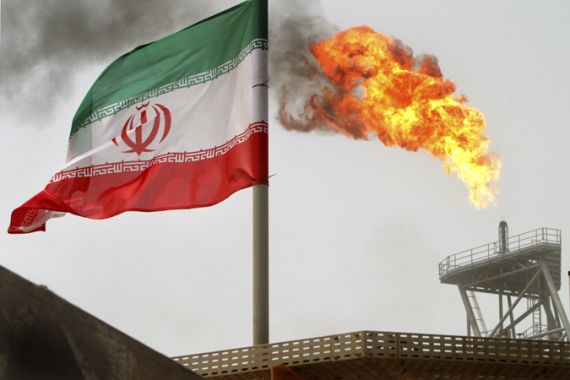Iran test-fires medium-range missile
Launch carried out two days after new EU oil embargo took effect, increasing tension around Strait of Hormuz.

Iran has said it has successfully tested medium-range missiles capable of hitting Israel, in response to threats of military action against the country, state media reported.
Meanwhile, Iran’s president said on Tuesday the new EU embargo on Iranian oil is “the strongest” yet imposed on the country.
The comments are Mahmoud Ahmadinejad’s first on the 27-member bloc’s ban on the purchase of Iranian oil since the measures took effect on Sunday.
State TV also quoted Ahmadinejad as saying Iran should use the ban “as an opportunity to wean the country’s budget off its dependence on oil revenues”.
Iran relies on oil exports for about 80 per cent of its foreign revenues.
The EU sanctions are the latest of several rounds of Western measures meant to pressure Iran over its disputed nuclear programme.
The US and its allies suspect Iran aims to develop atomic weapons. But Iran insists its programme is solely for peaceful purposes, such as energy and producing medical isotopes.
Israel has said it could attack Iran if diplomacy fails to secure a halt to its disputed nuclear energy programme.
The US also has said military force is a possible option but has repeatedly encouraged the Israelis to be patient while new economic sanctions are implemented against Iran.
‘Great Prophet 7’
Iran had announced the “Great Prophet 7” missile exercise on Sunday after the new European embargo took full effect following another fruitless round of big power talks with Tehran.
The Islamic Republic’s official English-language Press TV said the Shahab 3 missile, with a range of 1,300km and able to reach Israel, was tested along with the shorter-range Shahab 1 and 2 and other missile classes.
“The main aim of this drill is to demonstrate the Iranian nation’s political resolve to defend vital values and national interests,” Revolutionary Guards Deputy Commander Hossein Salami was quoted by Press TV as saying.
He said the tests were in response to Iran’s enemies who talk of a “military option being on the table”.
“The manoeuvres are an answer to the rude words spoken against Iran,” Fars news agency quoted Salami as saying.
Senior researcher Pieter Wezeman, of the Stockholm International Peace Research Institute, told the Reuters news agency that Iran’s missiles were still relatively inaccurate and of limited use in conventional warfare.
With conventional warheads, “their only utility is as a tool of terror and no more than that”, he said by telephone.
He added, however, that they could be suitable for carrying nuclear warheads, especially larger ones.
Blocking oil lanes
Iran denies Western accusations that it is seeking to develop nuclear weapons capability.
The world’s fifth-biggest oil exporter maintains that it is enriching uranium only to generate more energy for a rapidly growing population.
Tehran regularly states its claimed military dominance in the Gulf and has jangled nerves across the oil industry, which is concerned about any disruption in global crude supplies.
On Monday, a group of Iranian parliamentarians proposed a bill calling for the country to try to stop oil tankers shipping crude through the Strait of Hormuz to countries that support sanctions against it.
However, the Iranian parliament is relatively weak, analysts say, and the proposal has no chance of becoming law unless sanctioned by Iran’s clerical supreme leader.
That is seen as unlikely in the near term given that Western powers have said they would tolerate no closure of the Strait while Iranian leaders, wedded to strategic pragmatism for the sake of survival, have said they seek no war with anyone.
On Tuesday, the price of Brent crude broke $100 for the first time since early June, helping to claw back losses from a three-month slide in prices which has dented the income of oil-exporting countries.